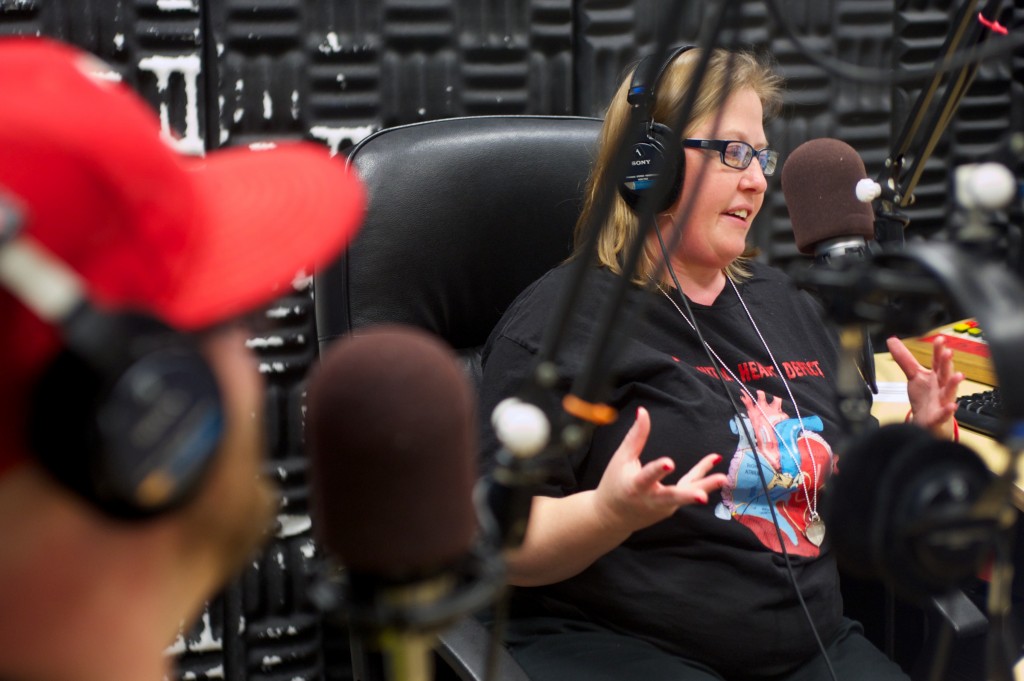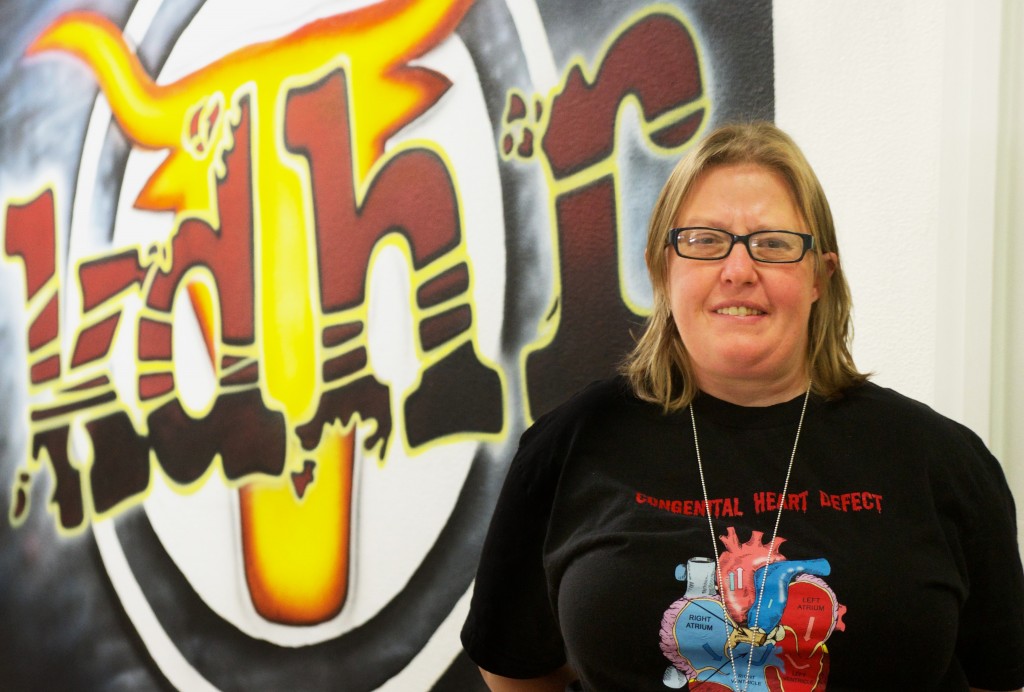“Gooood afternoon… This is K-D-H-R coming live from Cal State Dominguez. This is Michelle Padilla. …Happy Valentine’s Day everybody. It’s also go red for women American Heart Association Month …and we’re winding down Congenital Heart Defect Awareness Week…”

Michelle Padilla, a junior at California State University, Dominguez Hills, really puts her heart into raising awareness of heart disease. And she takes to the airwaves to do it. She’s one of two-dozen student volunteer on-air hosts at the on-campus radio station KDHR, which is funded by the Associated Students, Inc.
“I want to help those that want to get help and want to get better,” she said of why she hosts the talk and music segment.
There’s a good reason Padilla is passionate about advocacy. She understands first-hand the challenges of heart disease.
Padilla was born with a congenital heart defect known as tetralogy of Fallot that almost fatally starved her brain of oxygen during birth, leaving her with lasting physical and mental disabilities. She has undergone three open-heart surgeries; the first when she was two years old. At 18, she suffered a grand mal seizure that left her in a coma for two days and with brain damage. And when she was a child, doctors told Padilla’s parents that her life expectancy would be about 20. Today, she is 36 years old.
She has also undergone mouth, ear, and sinus surgeries to correct malformations associated with velocardiofacial syndrome (VCFS).
Padilla asserted that many adults don’t know they have the syndrome. However, the syndrome can be identified in patients through genetic testing. Signifying missing genetic material on chromosome 22, in region 1, band 1, sub-band 2, VCFS is also known as 22q11.2 deletion syndrome, and is estimated to be present in as many as one in 4,000 babies at birth, and in one in 68 children with congenital heart disease. Many who are afflicted with 22q11–as it is commonly called–display some of the characteristics it shares with autism, including attention deficit-hyperactivity disorder (ADHD) and learning disabilities.
In many respects it’s difficult to imagine that Padilla has any limitations. With the savvy of a marketing maven she maneuvers social media to make her pitch to whomever she can. She roots out information on the Internet about heart disease research and awareness and fundraising events, and, in addition to her radio show, she uses email, Twitter, YouTube, Facebook–you name it–to spread the word.
“I’m trying help motivate people who have a disability like myself, to overcome their learning disability to get better and stronger so they can go to school and get the help that they need,” she said.
Padilla knows what she speaks of. With plenty of self-determination and perseverance, and assistance from the Disabled Student Program and Services at Los Angeles Harbor College, in 10 years’ time she earned an Associate of Arts degree before transferring to CSU Dominguez Hills.
She now relies on the Disabled Student Services at CSU Dominguez Hills for guidance and encouragement when she needs it, toward earning a bachelor’s degree in human services, a major she chose because she wants to make a career of helping others.
The Carson resident’s efforts to raise awareness of Congenital Heart Awareness Week among the community have not gone unnoticed. She was recognized with a proclamation from the City of Carson on Feb. 11, presented to her by Mayor John Dear at the City Hall.
“I didn’t know what to say. I just panicked. …I was tongue tied,” she said of the event, adding that she is really just pleased that congenital heart disease was recognized.

She admitted she’s not comfortable in speaking in front of crowds, but radio is a perfect venue for her because when she’s talking on-air she feels like she’s chatting one-to-one with someone.
Alumnus Daryl Williams (Class of ’12, B.A., digital media arts/political science), a staff production manager at KDHR–and as it just so happens, a fellow “zipper club” member (referring to scarring from open-heart surgery) –added Padilla to the DJ line-up following an inquiry she made during a new student orientation tour of the station. He trained her on the studio’s equipment, but said she is responsible for all of the content during her Thursday 1:30 to 2:30 p.m. timeslot.
“We don’t tell her what to play or what to talk about. That’s all her,” Williams said. “She’s brought a lot of different things to the show. …It’s nice to have more of an informational type show mixed in with sports, hip-hop, and things like that.”
In addition to working at the station, Padilla is conducting the first of three internships required for her major. At the university’s Disabled Student Services Office, she assists with answering telephones, filing paperwork and test proctoring. One to always look to the future, she already has her second internship lined up at the American Heart Association, as well as some post-graduation plans.
“I’m hoping to go to UCLA and maybe write a book one day,” she said.
She has a jumpstart on one of her goals. Along with friends she’s made in a 22q11 support group, she is writing a book.
“A bunch of us got together and we’re writing our stories… of our life,” she said.
Most importantly, she wants to support efforts to find a cure for 22q11, but there’s other things she wants to do.
“I would like to bungee jump, but I can’t. I want to try skydiving, but I can’t do that. …I have a heart condition,” she said matter-of-fact like and without a trace of sadness.
But what she can do is walk. In October she covered the distance around the Rosebowl in Pasadena during the Greater Los Angeles Heart Walk sponsored by the American Heart Association, even though she was recovering from a recent broken leg. The double fracture left her with a permanent metal rod in her leg and she still uses a cane, but she’s not letting that dampen her resolve. She’ll next walk, as part of the VCFS Educational Foundation’s Third Annual Walk for Awareness, to raise awareness of 22q11 on March 10, 11 a.m. at the SouthBay Pavilion Mall located at 20700 Avalon Blvd., in Carson.
Padilla may have a congenital heart disease, but when it comes to advocacy she is all heart.
For information about KDHR and ways to listen, visit www.kdhr.net. To be an on-air guest, call (424) 785-0278 or connect via Skype with username “KDHR.”
For more information about the human services program in the Division of Health and Human Services, visit www.csudh.edu/cps/hhs/hd.
For further information about Disabled Students Services at CSU Dominguez Hills, visit www3.csudh.edu/student-affairs/dss.